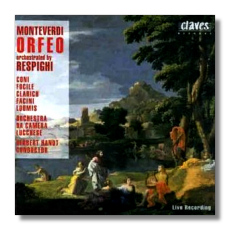
The Internet's Premier Classical Music Source
Related Links
- Monteverdi Reviews
- Latest Reviews
- More Reviews
-
By Composer
-
Collections
DVD & Blu-ray
Books
Concert Reviews
Articles/Interviews
Software
Audio
Search Amazon
Recommended Links
Site News
 CD Review
CD Review
Claudio Monteverdi

Orfeo
Orchestrated by Ottorino Respighi
Paolo Coni, baritone (Orfeo)
Nuccia Focile, soprano
Claudia Clarich, mezzo-soprano
Enrico Fancini, tenor
James Loomis, bass
Orchestra da Camera Lucchese/Herbert Handt
Claves CD 50-9419 ADD 77:05
The early-music purists will hate this; I loved it. Respighi's involvement with music of earlier periods was a hands-on one. And although his interest ranged beyond music from his own country, as his Bach orchestrations testify, it was chiefly to Italian composers that he was drawn; indeed, his efforts were part of a conscious campaign, in which later figures like Malipiero and Dallapiccola, were also involved, to rehabilitate a largely forgotten heritage. Respighi's three suites of Ancient Airs and Dances, arranged for orchestra from sixteenth- and seventeenth-century lute tunes, are well known; so too is Gli Uccelli; and the Trittico Botticelliano is a half-way house on the way to works like the Concerto gregoriano and Concerto in modo misolidico, written in his own language but still colored by the past.
His active response to the music of Monteverdi was likewise a thing of long-standing: Nikisch premièred his orchestration of the Lamento d'Arianna in 1908. Respighi had long wanted to produce a new arrangement of Monteverdi's Orfeo, and a commission from La Scala for the 1934/35 season was all the impetus he required. He enlisted the services of Claudio Guastallo, close friend and librettist of many of his earlier stage-works (La Campana sommersa, Maria Egiziaca, La Fiamma and Lucrezia), who condensed Monteverdi's original five acts into three (Guastallo's own commentary on the changes involved is quoted at length in Potito Pedarra's copious and informative notes).
Respighi's starting point was, if you like, the top and bottom of Monteverdi's original: "I have remained absolutely faithful to Monteverdi's vocal parts and the notated bass" – between which he gave himself rather more freedom, largely speaking Monteverdi's harmonic tongue but with his own orchestral dialect. The result is a soundworld frequently very close indeed to that of the Ancient Airs and Dances, which is to say a very agreeable one indeed: a score full of delightful orchestral detail that never threatens to swamp the original inspiration, old textures brought up gleaming in new colors, bringing out emotion that the conventions of Monteverdi's day preferred to leave implicit. At its brightest, it's marvelously jolly; at its noblest, particularly as the action progresses, it is dignified and moving. All in all, this is an important addition to our picture of Respighi, whose stage works, original or otherwise, have yet to catch up with the popularity of the orchestral works that may keep his name before the public – the Pines, Fountains, Roman Festivals – but which I feel are not the real Respighi.
That said, this is not the ideal recording of the work (though I know of no other). There are several important shortcomings. It's a live performance, with all the pitfalls that brings. The soloists (who, Orfeo apart, take a variety of roles) are not always bang on pitch, and the orchestra often exhibits similar failings. And though there's no problem with audience noise, at one point some Lucchese message boy can be heard rasping past on a motorbike – and, sure enough, five minutes later, his delivery done, he can be heard goiing back in the other direction, on a machine that makes a noise like a demented hairdryer. There are also some substantial cuts in the score, chiefly choruses from the outer acts – opening admitted to in the notes. I imagine that Claves must have thought long and hard about whether to release the tape – an analog original made in 1984, and in the end they made the right decision: this is too important to leave lying around in some studio vault. On that ground I have to recommend it, even strongly: there's too much beautiful music here for it not to be heard.
Copyright © 1996/1998, Martin Anderson


















